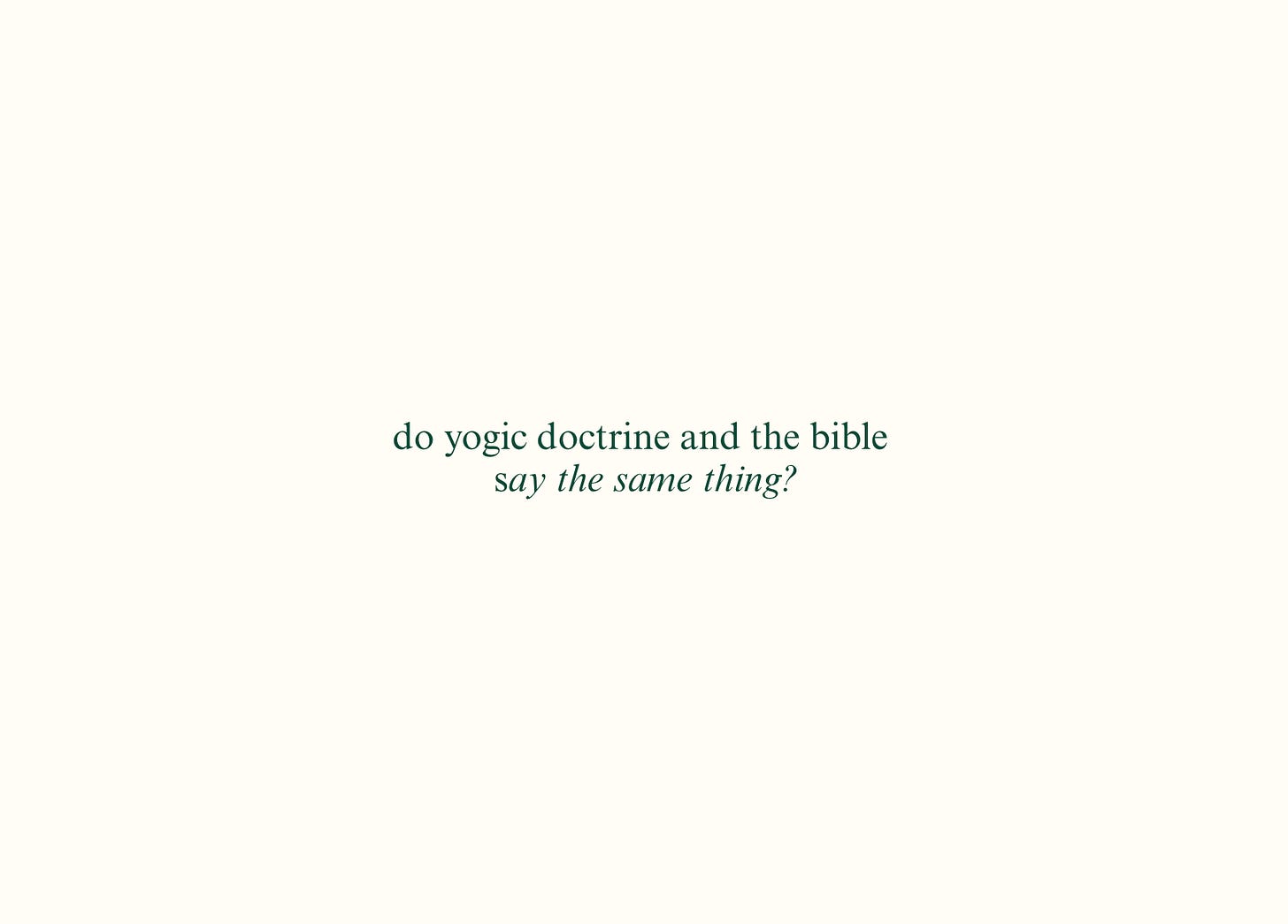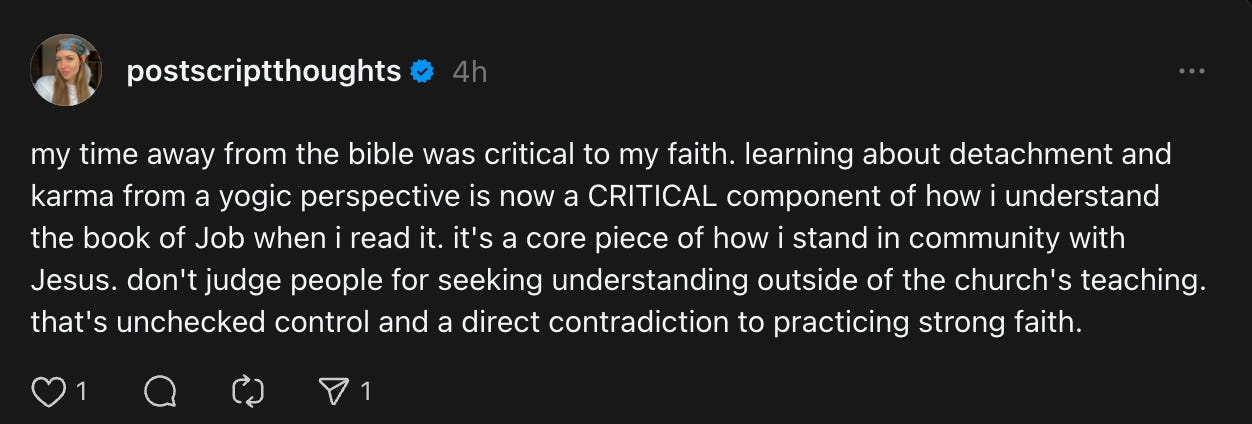Do Yogic Doctrine and the Bible Say the Same Thing?
Exploring how my decade long pivot from the bible brought me closer to Jesus than ever before
There’s a pink neon sign in my creative room that says “You’re like, really pretty <3”. As I sit beneath it on a no doubt overpriced, oversized white courduory lounge chair writing this article, I’m struck by the nuance of my very existence.
As I breathe, I am the antithesis of everything I thought was good, and faithful, and Godly as a child. I cherish the world and many secular things. I occasionally read Tarot cards for my subscribers to guide their creative endeavors. I read an English translation of the Bhagvad Gita alongside Swami Vivekānanda’s book of Yoga. And, I deeply revere chicklit novels, faerie smut, and pop culture podcasts narrated by ex-NYC-waitresses in their 40s.
But I still wake up at 6 am each morning to take communion under my neon pink sign before the sun rises. I still spend the next 2 hours of my morning with Bible under my nose. I still recite “Our Father in Heaven, hallow be thy name, your kingdom come, your will be done, on earth as it is in heaven” before I start my own rendition of prayer.
And I’m not less of a Christian for any bit of that.
I’m not less saved than my Catholic Aunt who sleeps under a portrait of The Virgin Mary, wrapped in rosary beads, praying to Saint Michael to protect her from the evil one through the night. And, I’m DEFINITELY not more saved than the man trying anything to get clean from his addiction at the local camp for people experiencing houselessness after life got to be too much to handle and things got away from him.
But I Can’t Stop Thinking About How the Church I Grew Up in Would Lose Its Mind if It Knew That.
Follow me on Threads and Instagram to read more precursors to Substack essays in real time as I shout them to the internet void if you’d like. :)
My chest feels tight just typing that, because admitting that my time away from the Bible—a decade, to be exact—was critical to my faith feels like confessing heresy to the people who raised me to believe that seeking understanding outside the church's walls was spiritual adultery.
I can’t fathom explaining to them that when I was in the thick of preparing for a sexual assault trial against my rapist and decided to learn about detachment and karma from a yogic perspective instead of reading the bible, that I, in fact, was NOT being pulled away from Jesus, but rather, it was Him laying the groundwork for how I love Him, and see Him, and experience Him through the world today.
How Do You Explain Yourself to Someone Committed to Not Understanding That the Way You Experience Life Today Is Rooted Directly in the Life You Lived Yesterday?
Specifically, how do I explain that my deep love for Bhakti Yoga, became a CRITICAL component of how I understood the book of Job this morning when my Bible literally fell open to Elihu’s response to Job in Chapters 32-37 this morning?
How do I explain to anyone, on either side of a religous coin, be it extreme Christianity or Atheism, that a core piece of why I believe that women have the right to choose, and that we should love our neighbors even if they speak in a different tongue than us is rooted in they way I have come to be in community with Jesus? How do I explain that pivoting into other forms of scripture when my church abandoned me because of my choices, and my life was falling apart, is the entire reason I have come to know and love Jesus outside of the church today?
The Truth Is, I Can’t Explain It to People Who Are Committed to Misunderstanding Anything Beyond Themselves. But if You’d Like To Stay and Listen, I’ll Try Explaining It to You Today.
There's this moment in Job where everything he's built—his family, his wealth, his health, his reputation—gets stripped away, despite being a faithful servant to God. His friends spend chapters and chapters trying to convince him that he must have done something wrong. That suffering equals punishment. That God's love is transactional. That it is clearly his doing.
That good ole B.C. spiritual bypassing combo, if you will.
Eventually, a new character, Elihu, is introduced, and he paints the will of God in a new light for Job. At first, I struggled to understand what he was saying. It felt like the same spiritual bypassing in a different font with a positive spin on it.
But then my years committed to understanding Karma and Bhakti Yoga kicked in, and the lightbulb turned on.
As the book goes on, Job's response isn't to figure out what he did wrong or how to fix it. His response is to detatch. To continue showing up. To continue being faithful, not because he expects a reward, but because faithfulness is who he is. Because love and faithfulness are simply states we exist in at a soul level, detached from anything tangible in this world.
His humanness was acknowledged. His anger. His fear. His frustration. His lack of faith was expressed. His questioning the reason behind his material suffering was allowed and a necessary precursor to his ability to let go and let God.
That's exactly what Krishna teaches Arjuna in the Gita—Nishkama karma: acting without attachment to the results of that action and doing one's duty (dharma) without being driven by personal desires for specific outcomes.
So, As It Clicked, I Started Writing This Essay. And Now We’re Here Exploring the Parallels in Real Time, Together.
The parallels between Karma Yoga and Job's story aren't coincidental. They're both pointing toward the same spiritual truth: that our job isn't to control outcomes, it's to show up with integrity regardless of what happens.
As a human, this sucks. Certifiably. If there’s anyone who understands that, it’s me. I promise. (Please see above reference to 2.5-year-long sexual assault trial, my past discussions on an abusive relationship I was in, my experience with homelessness at 17, and more as proof if you need. Or, if you’d like, you’re free to trust me, too. 😉)
In Karma Yoga, you perform your dharma—your righteous duty—without attachment to results. You do the work because the work itself is sacred, not because you're trying to manipulate the universe into giving you what you want or avoid an unfavorable outcome that may happen as a result of “bad” behavior.
Job’s line of logic accomplishes the exact same thing. He continues to praise God, not because he thinks it will bring his children back or restore his health and material possessions. He praises because that's who he is when everything else gets stripped away.
Both traditions are teaching us that suffering isn't punishment, just as blessing isn't reward. They're both just…there. The spiritual practice of learning to be yourself is the outcome of that thereness.
The Same Thing Happens With Bhakti Yoga and Jesus’ Exemplification of Love as a Verb, Not a Noun.
Bhakti Yoga is the path of devotion. It's about loving the divine so completely that your individual will dissolves into divine will. It's about surrender that comes from love, not fear.
Jesus in the garden of Gethsemane, sweating blood and saying "not my will, but yours be done"? That's Bhakti Yoga.
Jesus washing his disciples' feet, not because he has to, but because love is an action? That's Bhakti Yoga.
Jesus on the cross BEGGING God to forgive the people who are literally KILLING him? That's what happens when your love for the divine becomes so complete that you can't help but extend that love to everyone, even your enemies.
The difference isn't in the practice. The difference is in the names we use for it across different regions of the world and the stories we tell about it in houses that speak different tongues.
And That Very Realization Has Me Weeping Over My Keyboard As I Type This.
The church taught me that questioning their interpretation of scripture was doubt. That seeking wisdom from other traditions was a betrayal of my Messiah. That if I really had faith, I wouldn't need to look anywhere else for understanding. I would accept it without question, even if it meant I didn’t understand it.
But what if the opposite is true? What if judging people for seeking understanding outside the church's teaching is actually the weakest expression of faith possible?
Because, in my book, at least, if you truly believe that God is all-knowing and all-powerful, then you HAVE to believe he's capable of speaking to people through Rumi and Lao Tzu and the Buddha. You have to believe that truth doesn't belong exclusively to your denomination. You have to blindly trust that your God’s only goal is to get as many people as possible on this planet to feel his presence.
How can he achieve that if his stories only exist in one tongue, from one prophet, in one book, printed in one hemisphere of the world?







Bri, this landed in me like both balm and spark. The way you wove Job with Karma Yoga, suffering with detachment, love as verb not sentiment—it reminds me that truth has always worn many faces, many names. I’ve long felt God’s voice isn’t caged to one prophet, one book, one tongue, but breathes through poets, mystics, silence, even storm. Your words affirm what my bones already knew: divinity is too infinite to belong to any one denomination—it rises wherever hearts are willing to listen.
Oh my god, I've been meditating so much on dharma and karma as it frames the "work" of my marriage, and this landed in my inbox. love this so much, especially as a former evangelical Christian who has always loved yoga and exploring different lines of thought. I respect and appreciate your ability to hold onto nuance, duality, and more and maybe I'd still be part of a church if more people shared your openness =*)